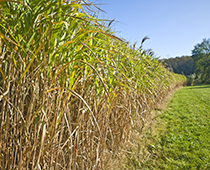Development of techniques for biomass production on marginal land in Europe
A new project will develop techniques for biomass production on marginal and contaminated land in Europe thus avoiding conflicting with food production.

Future energy production will primarily be based on bioenergy replacing fossil fuels. Currently, the majority of biofuels are produced from food crops grown on agricultural land. Unfortunately, several issues have been discovered in relation to the current way of producing bioenergy, leading to tensions between food and fuel production.
In order to avoid this conflict a new European bioenergy policy has been adopted. The new EU approach is that energy crops should be grown on medium or low quality agricultural land wherever possible.
A new research project entitled MISCOMAR, funded within the frame of FACCE SURPLUS, aims to support this new EU renewable strategy by developing techniques for biomass production on marginal land in Europe.
The primary focus is to improve the cultivation of miscanthus, a gigantic plant able to deliver a significant amount of biomass for energy production.
Miscanthus can grow on both marginal land and on contaminated land. If these areas are used for growing miscanthus for biomass production instead of food production, it will provide a more intelligent land use, says Dr. Marta Pogrzeba who is project coordinator.
The innovative character of the project is a holistic approach which combines the development of miscanthus for biomass on contaminated land to the integration of miscanthus into existing landscapes, crop rotations and farming systems providing environmental benefits as well as profit.
MISCOMAR is an all-round solution providing benefits on several levels. It will increase sustainability and reduce environmental impact. Further, the project results will offer economically viable production alternatives for land less suitable or unsuitable for food production, with reduced risk for heavy metal introduction into the food-chain, Dr. Marta Pogrzeba says.
Partners in the 3-year MISCOMAR-project include Polish Institute for Ecology of Industrial, German University of Hohenheim, UK Aberystwyth University.
The project has been granted 580.000 € from the FACCE SURPLUS ERA-NET Cofund.
FACCE SURPLUS
FACCE SURPLUS is an ERA-NET under the Cofund scheme of Horizon 2020 of the European Union. FACCE SURPLUS calls for collaboration among 15 countries and the EU for transnational research projects on the thematic area of sustainable and resilient agriculture. Further joint activities that go beyond this co-funded call are planned, in order to contribute to the establishment of a renewable bioeconomy in the EU.
Further information
Dr. Marta Pogrzeba
Institute for Ecology of Industrial Areas
Email: mag@ietu.katowice.pl
Mobile: 0048 602 484 667
